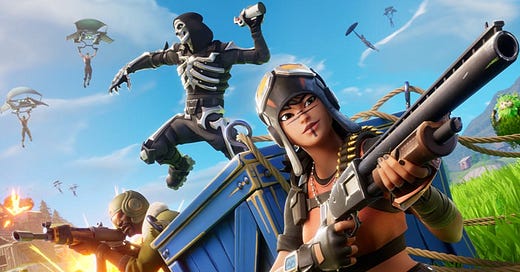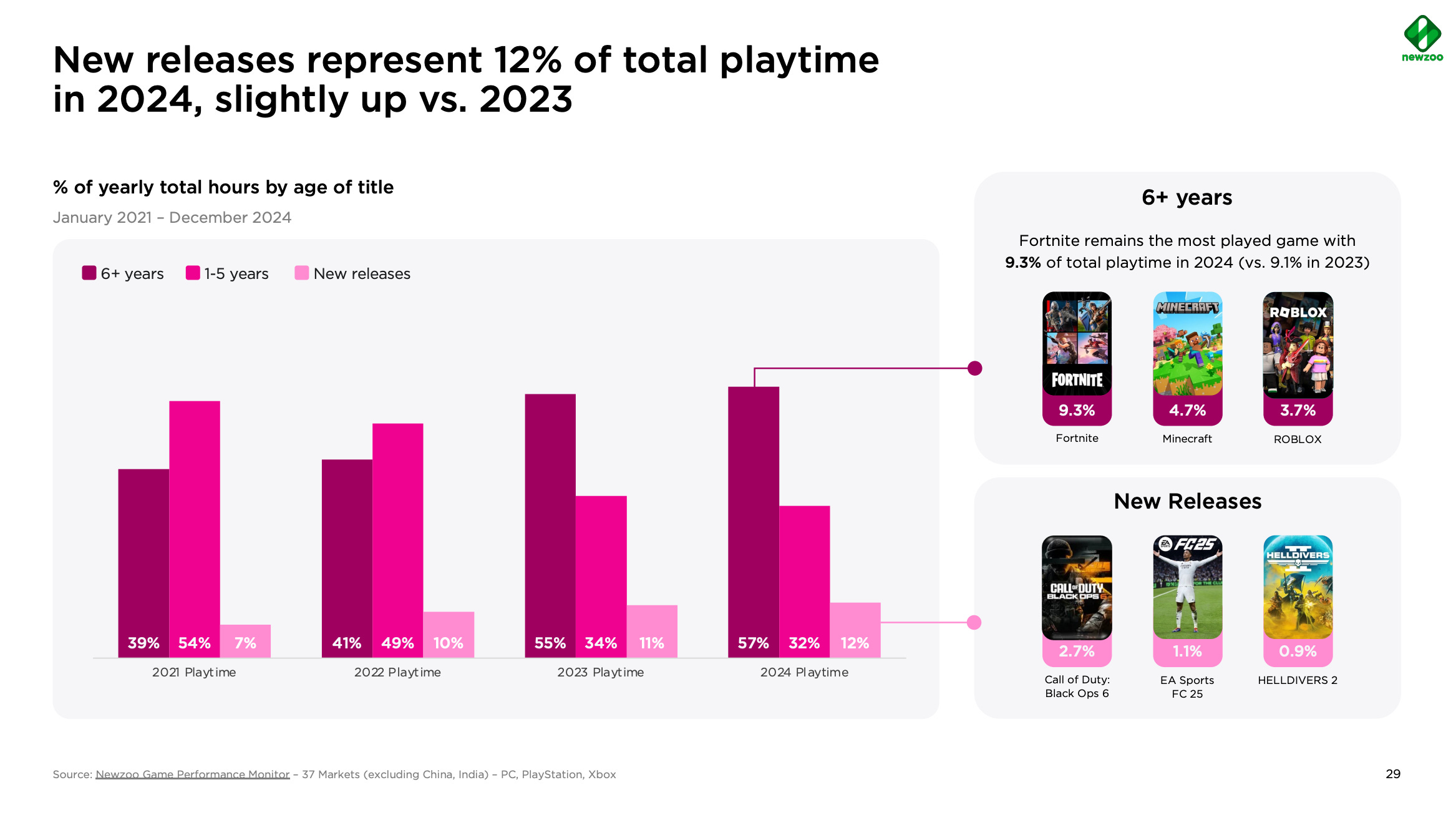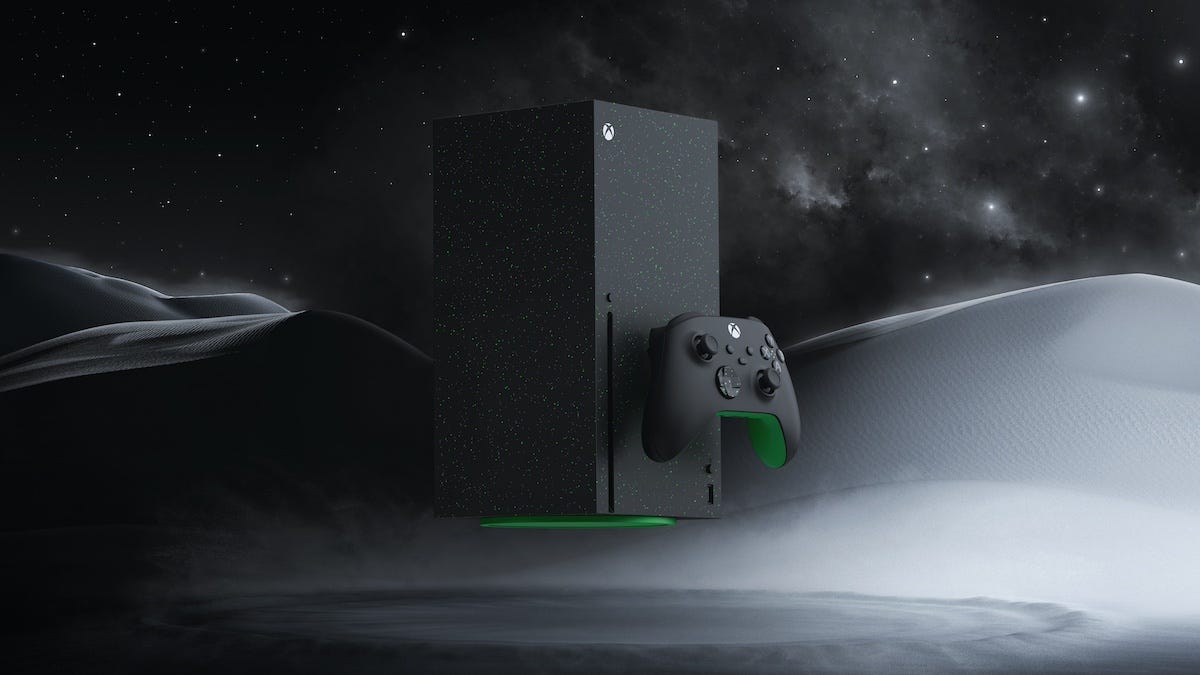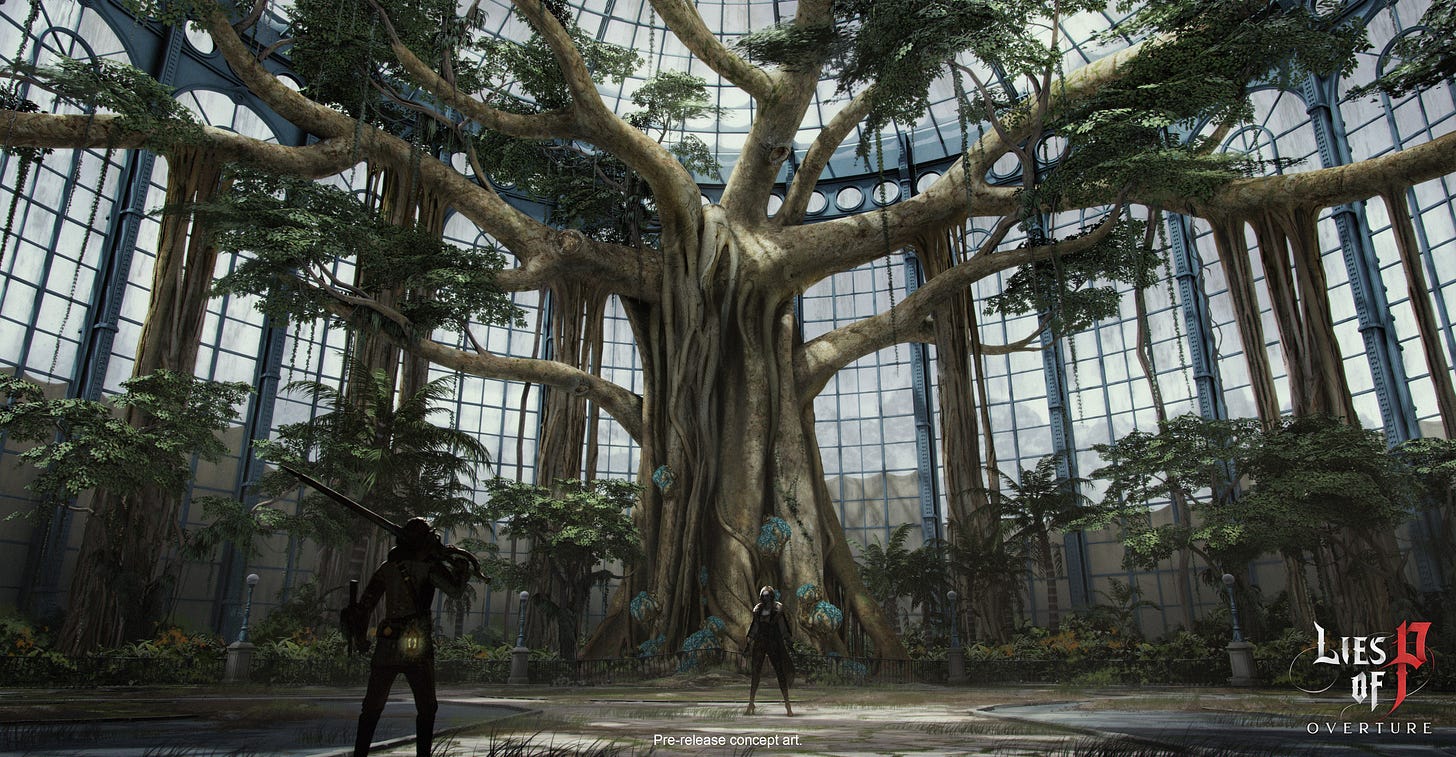A bleak stat about new video games is, upon further review, slightly less bad
Plus: A call for an Xbox boycott, and a Korean publisher eyes expansion
One of the most widely-reported stats about the video game industry last year was 61%.
That’s the percentage of players’ time in 2023 that gamers spent playing video games that were released six or more years prior.
The figure was calculated and published last year by Newzoo, the widely-referenced research firm whose stats about the size and performance of the game business are widely cited by the media and industry figures.
Eurogamer wrote about that stat last April. Their headline: Older games like Fortnite account for over 60% of playtime, new report suggests.
So did Game Discover Co. And Kotaku. And VGC.
I wrote about it, too, back in March 2024, after I heard it from a Newzoo rep during a talk at that year’s Game Developers Conference.
A year later, Newzoo has published its 2025 PC and Console Gaming Report and they’ve revised their math. Nothing huge, but the number to cite is now a little lower and a little less terrible for new games.
The market intelligence group stands by the overall sentiment that new video games barely have room to breathe in the modern video game market
Newzoo’s newest report is full of data suggesting that players remain hooked on a small number of games, while the thousands of new ones released each year get a very small amount of attention.
This year’s Newzoo PC/console industry report, however, puts the percentage of time that gamers spent in 2023 on games six years or older at 55%, not 61%. That number ticked up to 57% for 2024, according to the new report.
A rep for Newzoo told me that the revised figure for 2023 is “a result of implementing our new data sources, model enhancements, and client feedback earlier this year.” They continued: “We reviewed and restated our data to ensure that it is providing the most complete and accurate picture possible.”
Fair enough. The number’s roughly the same, just not quite as bad. And with it comes what appears to be a sliver of good news for new games: a gradual uptick in the time spent on new releases in the last several years.
Here’s the key slide from Newzoo’s new study:
See that short pink bar getting just a little higher each year? Those are the new games.
What to make of all this?
For one, you can count this as example number 5,312 of how hard it is to get good, hard numbers from an infamously opaque industry.
Second, you’ll notice from the chart above that it’s the games in the middle category—games that are 1-5 years old—that are losing out to the older ones, in some cases because they might be aging themselves into the older-game category.
The uptick in new games appears to be an encouraging trend, though a dig deeper into Newzoo’s report shows that the “new releases” that garnered the most play time in 2024 were not exactly the games you’d call brand-new. We’re talking about the latest annual iterations of Madden, Call of Duty, FIFA/EASportsFC and NBA 2K. Only after that do the likes of Helldivers II pop up on PlayStation and Palworld on Xbox.
Some additional wrinkles:
NewZoo’s report on playing time involves surveys of 37 markets, including the U.S. It doesn’t include China, so we can’t see how the launch of Black Myth: Wukong, a mega-hit in China, impacted the playing of new releases there.
The report covers PC, PlayStation and Xbox, but no Switch. That was unlikely to have depressed the firm’s count of playing time for new releases in 2024. Nintendo had no big hits last year. But, unless Newzoo is able to pull Nintendo data this year, Newzoo’s 2026 report will not be able to measure the impact of a new Mario Kart (the June 5-dated Mario Kart World for Switch 2) on new-release playing time for 2025, when it’s time to run their 2026 report.
But next year’s report should show the impact of another major new release this year: the presumably late-2025 GTA VI. That’ll cut into people’s playing time of some of those really old games, right?
Item 2: Call for an Xbox boycott
Microsoft’s gaming business—Xbox, Call of Duty, Candy Crush, etc—has been added to a list of boycott targets by the BDS (Boycott, Divestment, Sanctions) movement, which says the tech giant “provides the Israeli military with Azure cloud and AI services that are central to accelerating Israel’s genocide of 2.3 million Palestinians in the illegally occupied Gaza Strip.”
BDS doesn’t specifically say that Microsoft’s gaming businesses support Israel’s war effort, but says that the gaming wing of the company “make[s] up a considerable portion of Microsoft’s profit.”
(Digging into the numbers, Microsoft’s “intelligent cloud” division, which encompasses AI, generated $26 billion in revenue in the final three months of 2024; its personal computing division, which includes gaming and Windows, generated $15 billion.)
On Monday, two Microsoft employees interrupted the company’s 50th Anniversary event “demanding that Microsoft ‘stop using AI for genocide in our region,’” The Verge reports.
One of the employees, who was subsequently fired, said their dismissal letter from Microsoft stated that the worker had made “ hostile, unprovoked, and highly inappropriate accusations against the CEO, the Company and Microsoft generally,” per The Verge.
In its coverage of the incident, the AP noted:
An investigation by The Associated Press revealed earlier this year that AI models from Microsoft and OpenAI had been used as part of an Israeli military program to select bombing targets during the recent wars in Gaza and Lebanon
Game File twice this week reached out to an Xbox spokesperson for any Microsoft comment on the BDS call for a boycott. I was told that Xbox did not have a statement to share.
Correction: April 11, 9:45am - Fixed the explanation of the BDS acronym.
Item 3: An old company with a new hit is ready to grow
“You’re not supposed to be expanding as a video game company right now,” I recently said to some executives at Neowiz, the developer/publisher of Lies of P, which is currently expanding.
“You’re supposed to be collapsing and struggling.”
They laughed, thankfully.
This was mid-March, in San Francisco, the week of the Game Developers Conference. I’d booked a meeting with Jiwon Choi, director of surprise 2023 hit Lies of P, a game that’s basically Dark Souls mixed with Pinnochio—in a serious way. Choi’s studio, Round8, is owned by Neowiz.
Lies of P was such a big hit for Neowiz that the Korean gaming company is now aggressively growing.
The company was founded in 1997 and has about 1,000 employees, Neowiz director of marketing InJoon Hwang told me during our meeting. Neowiz had built itself up with mobile and free-to-play PC games, the kind of formats that succeed in Korea, but Lies of P has ignited an effort to produce premium games with more global/cross-over appeal.
They had hoped that a Pinocchio game could help take advantage of the character’s fame, even if more people know the puppet because of the Disney cartoon than they do the game’s more direct inspiration, the darker, original novel by Carlo Collodi.
“I wanted to make sure to leverage a property and legend that garners people's immediate attention,” Choi told me in March, via a translation by Hwan.
Now, Neowiz wants to do more of that. The company has opened an office in the U.S. and is expanding in Europe as well. It’s signing publishing deals, including one with Wolfeye, the studio helmed by Arkane (Dishonored) founder Raphael Colantonio. Late last year, Neowiz announced an $8 million publishing deal with Zakazane, a Polish studio with talent from 11 Bit and CD Projekt RED, for a “neo-Western RPG.”
“The key factor that we look for is actually a strong narrative,” Hwan said. “If the story actually gives us a foundation of material to connect with our customers around the world, then we can start building games that resonate with the users, and then that will help us build a franchise.”
Last week, Neowiz announced a contest for indie developers of narrative-based games to pitch their projects to the company. Three winners will split a $115,000 prize pool, and the top 10 overall will, per contest rules, receive “consulting for launch and marketing strategies,” from Neowiz.
As for Neowiz’s rising fortunes, amid the closure and struggles of so many other game studios and publishers, Hwan told me: “We feel lucky that we are in that situation. So much of it is timing. And from the publishing side of it, we are very grateful for the developers who gave us a chance for us at that time.”
Lies of P is expanding, too. Its downloadable add-on, Overture, is slated for later this year.
Item 4: In brief…
👀 Amid confusion and controversy over Nintendo saying it will sell its Switch 2 introductory game, Nintendo Switch 2 Welcome Tour—rather than bundle it at no added cost with the system—former Nintendo of America Reggie Fils-Aimé for some reason has tweeted some old interview clips of himself.
In these clips, he explains that, 20 years ago, he persuaded Nintendo management in Japan to bundle Wii Sports with the Wii in North America and that the system thrived in markets with the free bundle, in a way that it didn’t in markets where Wii Sports was sold separately.
Hmmm.
🤔 “Game Transfer Phenomenon” is the experience of seeing health bars or having the urge to collect nearby items in real life after playing video games—when the virtual world seems to manifest in the physical world—the BBC explains.
🎓 Saber CEO Matt Karch (remember him?) has donated $5 million to the University of Texas at Austin to help create the Karch Gaming Institute at UT’s Moody College.
The college is “developing courses with the initial goal of creating a minor to focus on the business and production of digital games,” per a press release.
🔎 Would you believe there are already Switch 3 rumors?
🧸 Best headline of the week is from Polygon: Court denies Build-A-Bear’s request to be sent 3,000 Squishmallows as part of lawsuit









Looking at the chart for new releases vs older game still looks pretty bleak for the industry, once you focus on the stats for games 1-5 years old. That ought to be far and away the most popular group, since it represents the games that are still new and cutting-edge and should also have the benefit of exposure and word-of-mouth. Instead, that sector is steadily declining. Yes, some of them are probably "aging" into the 6 years+ games, but the 1-5 group has declined more (22 points) than the the 6+ group has grown (18 points). This is during a period when the industry has been super-aggressive about pushing *everything* into the live-service mold, which in theory is supposed to extend the shelf life of games so that they still have active player bases years after release. Instead, people seem to be trying more newly-released games but not sticking with them.
That headline definitely reads like a ChatGPT hallucination.